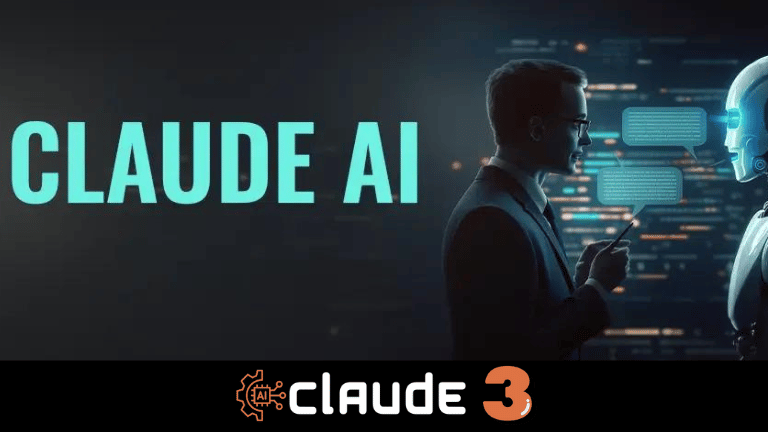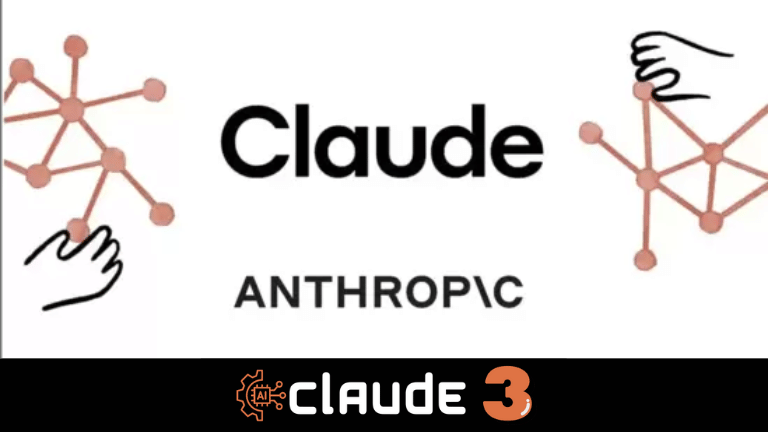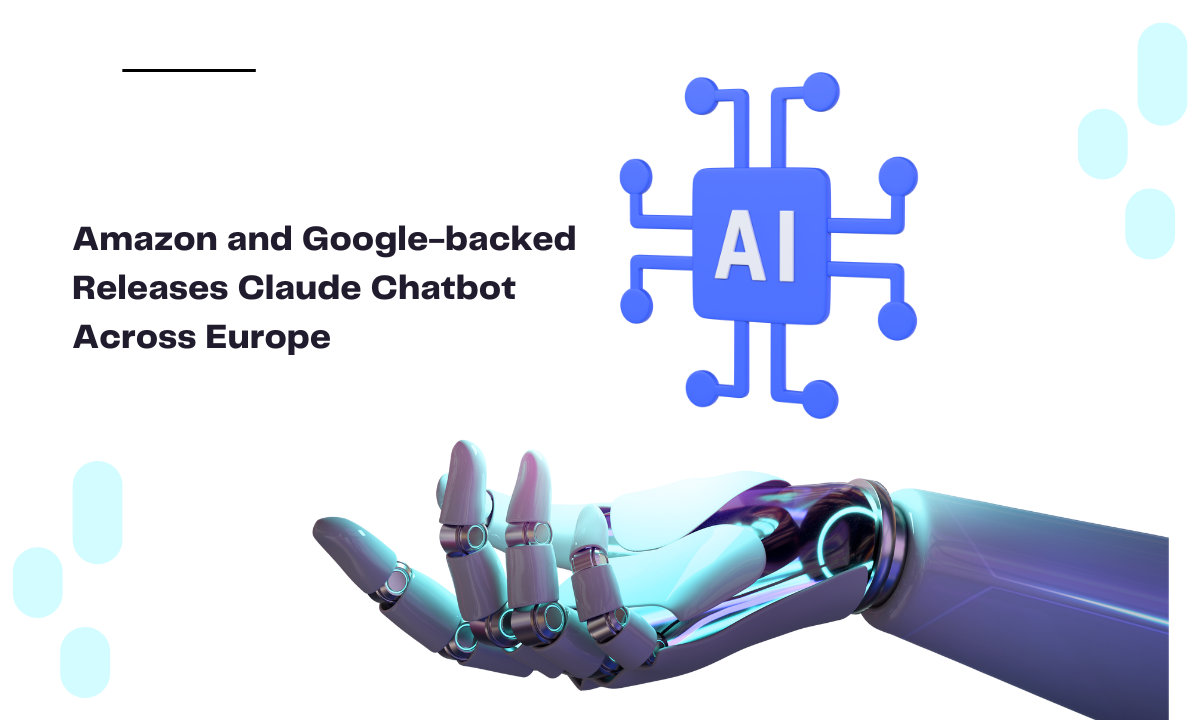Amazon and Google-backed Releases Claude Chatbot Across Europe 2024.In a move that is set to shake up the conversational AI landscape in Europe, Anthropic, the cutting-edge artificial intelligence research company backed by tech giants Amazon and Google, has officially released its highly anticipated chatbot, Claude, across the continent. This groundbreaking development marks a significant milestone in the company’s mission to bring advanced AI solutions to the masses and revolutionize the way we interact with technology.
The Rise of the AI Powerhouse
Anthropic has quickly established itself as a force to be reckoned with in the world of artificial intelligence. Founded by renowned researchers and entrepreneurs, including Dario Amodei, Paul Christiano, and others from leading institutions such as OpenAI and Google Brain, the company has attracted significant attention and investment from tech giants like Amazon and Google.
With a strong focus on developing AI systems that are safe, ethical, and beneficial to humanity, Anthropic has been at the forefront of pushing the boundaries of what is possible in the realm of conversational AI. The company’s innovative approach to AI development, which includes techniques such as “constitutional AI” and “debate,” aims to create intelligent systems that are aligned with human values and capable of engaging in nuanced and contextual interactions.
Introducing Claude: Anthropic’s Flagship Chatbot
Claude is Anthropic’s flagship chatbot, a state-of-the-art conversational AI system that promises to redefine the way we interact with machines. Powered by cutting-edge natural language processing techniques and a vast knowledge base, Claude is designed to engage in natural and contextual conversations on a wide range of topics, from general knowledge and creative writing to complex analytical tasks and problem-solving.
At the heart of Claude’s capabilities lies Anthropic’s proprietary “constitutional AI” approach, which aims to imbue the chatbot with a strong sense of ethics and alignment with human values. This innovative technique ensures that Claude’s outputs are not only intelligent and relevant but also trustworthy and beneficial, steering clear of harmful or unethical content.
Key features and capabilities of Claude include:
- Natural Language Understanding: Claude excels at comprehending and interpreting human language in all its nuances, enabling seamless and intuitive conversations.
- Contextual Awareness: Unlike many chatbots that struggle with maintaining context, Claude leverages advanced language models to understand the full context of a conversation, providing relevant and coherent responses.
- Knowledge Generation and Reasoning: Powered by Anthropic’s cutting-edge language models, Claude can draw upon its vast knowledge base to generate informative and insightful responses, demonstrating strong reasoning and analytical capabilities.
- Ethical and Value-Aligned Outputs: Thanks to its constitutional AI training, Claude aims to provide outputs that are aligned with human values, promoting beneficial and trustworthy interactions.
- Multilingual Capabilities: Claude has been trained on data from multiple languages, enabling it to understand and communicate in various tongues, making it a valuable asset for global applications and cross-cultural communication.
With its advanced capabilities and commitment to ethical and beneficial outputs, Claude promises to redefine the standard for conversational AI, paving the way for more natural, trustworthy, and meaningful interactions between humans and machines.
Applications and Use Cases Across Europe
The launch of Claude across Europe opens up a myriad of potential applications and use cases across various industries and sectors. Here are some key areas where Claude could make a significant impact:
- Customer Service and Support: Claude’s ability to engage in natural and contextual conversations could revolutionize customer service in Europe, enabling businesses to provide more personalized and efficient support through intelligent chatbots and virtual assistants.
- Education and Tutoring: Claude’s knowledge generation and reasoning capabilities make it an ideal tool for personalized learning and tutoring systems, assisting students across Europe with complex questions and adapting to individual learning styles.
- Healthcare and Wellness: In the healthcare sector, Claude could serve as a valuable assistant for patients and healthcare professionals alike, answering medical queries, providing personalized health advice, and enhancing patient care and well-being.
- Retail and E-Commerce: Claude’s conversational and knowledge-sharing capabilities could transform the online shopping experience for European consumers, offering personalized product recommendations, answering queries, and guiding customers through the purchase process.
- Travel and Hospitality: For the tourism industry, Claude could serve as a virtual concierge, providing travelers with personalized recommendations, booking assistance, and real-time support throughout their journeys across Europe.
- Financial Services: In the financial sector, Claude’s analytical and reasoning skills could assist in providing personalized financial advice, answering complex queries, and facilitating more transparent and accessible communication between institutions and their clients in Europe.
- Creative Industries: For writers, artists, and content creators across Europe, Claude’s natural language generation capabilities could serve as a powerful tool for ideation, brainstorming, and creative collaboration, fostering innovation and artistic expression.
These are just a few examples of the multitude of applications and use cases that Claude could enable across Europe. As businesses and organizations in various industries embrace the power of conversational AI, Claude’s unique capabilities and commitment to ethical and trustworthy outputs position it as a game-changer in the field.
Responsible AI and Ethical Considerations
As with any transformative technology, the release of Claude across Europe raises important ethical considerations and highlights the need for responsible AI development and deployment. Anthropic, backed by tech giants Amazon and Google, has been at the forefront of addressing these concerns, placing a strong emphasis on ethical AI practices and value alignment.
- Privacy and Data Protection: Ensuring the privacy and protection of user data is a crucial aspect of Claude’s deployment in Europe. Anthropic has implemented robust data security measures and adheres to stringent privacy regulations, such as the General Data Protection Regulation (GDPR).
- Transparency and Accountability: To foster trust and transparency, Anthropic is committed to providing clear explanations about Claude’s capabilities, limitations, and the data and algorithms used in its development, enabling users to make informed decisions and holding the company accountable for its AI systems.
- Bias and Fairness: Anthropic has taken measures to mitigate potential biases and ensure fairness in Claude’s outputs, including rigorous testing, auditing, and the incorporation of diverse datasets during training to prevent discriminatory or harmful outputs.
- Responsible Use and Governance: Anthropic recognizes the importance of responsible use and governance of AI systems like Claude. The company actively collaborates with policymakers, regulators, and industry partners to establish guidelines and best practices for the ethical deployment and oversight of conversational AI technologies in Europe.
By prioritizing ethical considerations and responsible AI practices, Anthropic, with the backing of Amazon and Google, aims to set a new standard for the development and deployment of conversational AI systems, fostering trust and ensuring that the benefits of these technologies are realized in a way that aligns with societal values and the well-being of individuals and communities across Europe.

The Future of Conversational AI in Europe
The launch of Claude across Europe represents a significant milestone in the evolution of conversational AI, but it is merely the beginning of a transformative journey. As Anthropic continues to refine and enhance Claude’s capabilities, the future of human-machine interactions in Europe promises to be even more seamless, intuitive, and transformative.
With the backing and resources of tech giants like Amazon and Google, Anthropic is well-positioned to drive continuous innovation and improvement in the field of conversational AI. This could include incorporating new techniques and advancements in natural language processing, machine learning, and ethical AI practices, as well as exploring multimodal interactions, personalization, and industry-specific customizations.
As Claude’s capabilities continue to evolve, it could become an indispensable part of daily life for individuals, businesses, and organizations across Europe, enabling more efficient and effective communication, problem-solving, and decision-making processes.
However, realizing the full potential of conversational AI in Europe will require a collaborative effort from all stakeholders involved, including policymakers, regulators, industry partners, and the broader public. By working together to establish robust governance frameworks, foster trust and transparency, and promote responsible AI practices, Europe can pave the way for a future where advanced conversational technologies like Claude become a trusted and beneficial part of society.
The Power of Collaboration and Partnership
The successful launch and adoption of Claude across Europe would not have been possible without the powerful collaborations and partnerships that Anthropic has fostered. By joining forces with tech giants like Amazon and Google, Anthropic has gained access to unprecedented resources, computational power, and cutting-edge research capabilities.
This collaboration has proven to be a symbiotic relationship, with Anthropic benefiting from the expertise and resources of these industry leaders, while Amazon and Google gain invaluable insights and access to Anthropic’s groundbreaking AI technologies. Such partnerships not only accelerate the development and deployment of advanced AI systems like Claude but also foster an environment of cross-pollination and knowledge-sharing, driving innovation across the entire AI ecosystem.
Moreover, Anthropic’s partnerships extend beyond just tech giants. The company has actively engaged with academic institutions, research organizations, and industry partners across Europe, tapping into a wealth of domain expertise and local knowledge. By collaborating with these stakeholders, Anthropic has been able to tailor Claude’s capabilities to specific regional and cultural contexts, ensuring its relevance and effectiveness in addressing the unique needs and challenges faced by European businesses and communities.
Overcoming Challenges and Addressing Concerns
As with any disruptive technology, the widespread adoption of Claude across Europe is not without its challenges and concerns. One of the primary obstacles is the inherent complexity and opacity of large language models like Claude. While these systems excel at generating human-like responses, their inner workings and decision-making processes can be opaque, making it difficult to fully understand and interpret their outputs.
To address this challenge, Anthropic has been at the forefront of developing techniques for interpretable and explainable AI. By leveraging advanced techniques such as attention visualization and model distillation, Anthropic aims to provide greater transparency into Claude’s decision-making processes, enabling users and researchers to better understand how the system arrives at its outputs.
Another concern that has been raised is the potential for AI systems like Claude to perpetuate biases and discriminatory patterns present in the training data. Anthropic has taken proactive measures to mitigate this risk, employing rigorous testing and auditing procedures to identify and address potential biases. Additionally, the company has invested in the curation and diversification of its training datasets, ensuring that Claude is exposed to a wide range of perspectives and viewpoints.
Furthermore, as Claude’s capabilities continue to expand, there are valid concerns about the impact on employment and job displacement. While it is true that certain tasks and processes may be automated or augmented by AI systems like Claude, Anthropic recognizes the importance of fostering a responsible and gradual transition. By working closely with policymakers, labor organizations, and industry partners, Anthropic aims to develop strategies that promote upskilling, retraining, and the creation of new job opportunities in the AI-driven economy.
Embracing a Future with Conversational AI
As Claude continues to gain traction across Europe, it is becoming increasingly clear that conversational AI will play a pivotal role in shaping the future of human-machine interactions. However, it is crucial to recognize that this technology is not a panacea for all challenges or a replacement for human intelligence and expertise. Instead, Claude should be viewed as a powerful tool and a complementary resource that can augment and enhance human capabilities.
By fostering a symbiotic relationship between humans and AI systems like Claude, we can unlock new frontiers of innovation, efficiency, and problem-solving across various domains. For instance, in the healthcare sector, Claude could assist medical professionals in diagnosing complex conditions, synthesizing vast amounts of research data, and providing personalized treatment recommendations, ultimately improving patient outcomes and healthcare delivery.
In the realm of education, Claude could revolutionize personalized learning by adapting to individual student needs, providing tailored guidance and feedback, and even generating customized educational materials. This could help address learning gaps, foster a love for lifelong learning, and equip students with the skills and knowledge needed to thrive in an increasingly complex and rapidly changing world.
Moreover, the creative industries stand to benefit immensely from the integration of conversational AI like Claude. Writers, artists, and content creators could leverage Claude’s capabilities for ideation, brainstorming, and creative collaboration, pushing the boundaries of artistic expression and fostering new forms of human-machine co-creation.
As we embrace this future with conversational AI, it is essential to maintain a proactive and ethical approach to AI development and deployment. Anthropic, with the backing of industry titans like Amazon and Google, must continue to prioritize responsible AI practices, promote transparency and accountability, and foster trust among users and the broader public.
This includes ongoing efforts to address issues such as privacy and data protection, bias mitigation, and the establishment of robust governance frameworks and industry standards. By taking a proactive and collaborative approach, Anthropic and its partners can pave the way for the responsible and beneficial integration of conversational AI technologies like Claude into various aspects of society.
Conclusion: A New Era of Human-Machine Interaction
The launch of Claude across Europe by Anthropic, with the backing of tech giants Amazon and Google, marks a significant milestone in the evolution of conversational AI. This powerful chatbot, imbued with a strong sense of ethics and alignment with human values, promises to redefine the way we interact with machines, offering a glimpse into a future where intelligent systems become trusted and indispensable partners in our daily lives.
As Claude’s capabilities continue to expand and its applications permeate various industries and sectors, it is crucial to maintain a balanced and responsible approach to its development and deployment. By prioritizing ethical considerations, fostering transparency and accountability, and promoting collaboration among stakeholders, we can ensure that the benefits of conversational AI are realized in a way that aligns with societal values and the well-being of individuals and communities.
The journey towards a future where conversational AI seamlessly integrates into our lives has only just begun. As we navigate this transformative path, it is essential to embrace a spirit of curiosity, innovation, and ethical responsibility. By doing so, we can unlock the full potential of technologies like Claude and shape a future where human and machine intelligence work in harmony, driving progress and enriching our lives in ways we have yet to imagine.

FAQs
What is Claude and who backs it?
Claude is a chatbot developed by Anthropic, backed by tech giants Amazon and Google. It’s designed to provide conversational assistance and support to users across Europe.
How does Claude differ from other chatbots?
Claude leverages cutting-edge technology from Amazon and Google, incorporating advanced natural language processing (NLP) and machine learning algorithms for more human-like interactions and personalized responses.
In which European countries will Claude be available?
Claude will be launched across Europe, initially in select countries, with plans for further expansion to cover more regions in the future.
What services can users expect from Claude?
Users can expect Claude to assist them with a wide array of inquiries, ranging from customer support queries to providing information and recommendations on various topics.
How can businesses benefit from integrating Claude?
By integrating Claude, businesses can enhance customer engagement, streamline support processes, and provide seamless assistance to users, ultimately driving operational efficiency and customer satisfaction.
